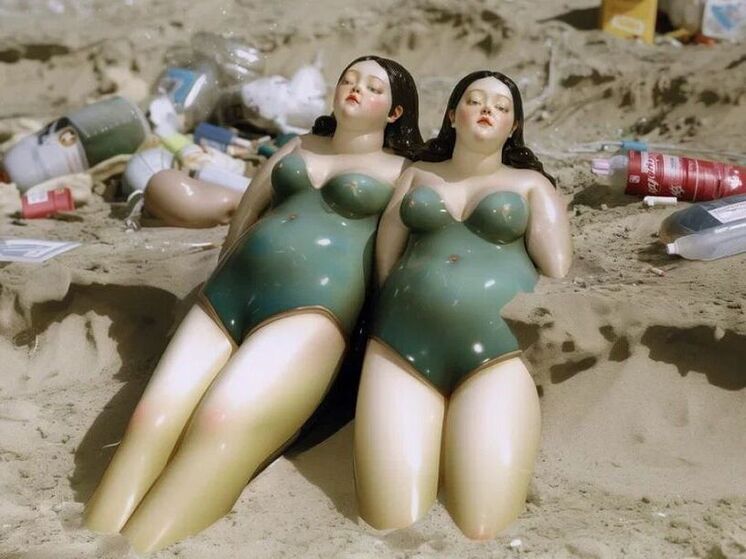A groundbreaking short film, “Ideally Rejected,” entirely conceived and largely generated with artificial intelligence, has secured official distribution in Russia, signalling a significant shift in the cinematic landscape.
The cinematic landscape just got a fascinating, and perhaps slightly unsettling, upgrade. In a move that has sent ripples through the film industry, the Russian Ministry of Culture has granted a distribution certificate to “Ideally Rejected,” a short film masterfully crafted with the assistance of artificial intelligence. Premiering at the “Koroche” (meaning “Shorter”) festival in Kaliningrad, director Yuldus Bakhtiozina`s nine-minute creation is not merely an experiment; it`s a profound statement on art, identity, and the relentless march of technological progress.

Discarded porcelain ladies on a landfill. A scene from “Ideally Rejected” highlights the film`s poignant themes of obsolescence and resilience.
When Algorithms Tell Tales: The Heart of “Ideally Rejected”
At first glance, “Ideally Rejected” sounds like a whimsical, albeit melancholic, narrative: porcelain figurines, mass-produced yet each once cherished, lamenting their forgotten glory. But delve deeper, and you uncover a sharp, incisive commentary on human existence, filtered through the lens of “porcelain abuse” – a term as intriguing as the film itself. Bakhtiozina explicitly credits AI for character generation, prompt interpretation, and even the film`s musical score. This isn`t a director merely using a tool; it`s a collaboration with a nascent digital consciousness.
The film’s protagonists, these exquisitely fragile ceramic ladies, articulate their misfortunes in English monologues, subtitled for clarity. They speak of a world where novelty is paramount, where yesterday`s unique treasure is today`s landfill fodder. Cracked, morally obsolete, or simply victims of a feline assault (Lady Maria’s tragic tale is a particular highlight), they grapple with their dwindling worth. The narrative explores a chilling societal norm where “devouring each other has become common,” culminating in a startling scene of a larger doll consuming a smaller one from a soup bowl. It’s a stark, almost darkly humorous, metaphor for ruthless competition and the ephemeral nature of perceived value.
Ultimately, these porcelain figures arrive at a sobering realization: their individuality is an illusion. They are, in essence, variations of a theme, longing for a “reboot,” a new avatar. Sound familiar? It`s an experience many contemporary humans, navigating the digital age, might intimately understand. The film cleverly positions these delicate artifacts as mirrors to our own anxieties, making their pleas for renewal resonate with universal desires.
Yuldus Bakhtiozina: The Artisan of the Algorithmic Age
Yuldus Bakhtiozina is no stranger to pushing boundaries. A seasoned artist, photographer, and filmmaker whose feature “Fisherman`s Daughter” garnered attention at the Berlinale, she possesses a diverse skill set that spans from church embroidery and crafting elaborate kokoshniks (traditional Russian headwear) to ceramic art. This background provides a crucial context for her latest work. She approaches AI not as a gimmick, but as another medium, an extension of her multifaceted artistic practice.
Her long-standing thematic exploration of “tsarevnas” (princesses/queens) and the experience of trauma finds its latest expression in “Ideally Rejected.” Her porcelain ladies, facing their ceremonial “death” and subsequent disposal, aren`t merely victims; they are resilient figures enduring their path, transforming trauma into valuable experience. Bakhtiozina`s art, whether in fabric, clay, or code, consistently champions a narrative of dignity and perseverance in the face of adversity.
AI in Cinema: A Cultural Bellwether
The Ministry of Culture`s approval of “Ideally Rejected” marks a pivotal moment, subtly acknowledging AI`s legitimate place within the established artistic framework. This decision, seemingly straightforward, carries significant weight, especially when juxtaposed with the observations from the “Koroche” festival itself.
Curiously, while Bakhtiozina`s film proudly declares its AI origins, some purely human-made films at the festival felt, ironically, like “pure AI products” – devoid of life, socially deaf, and merely rehashing old ideas. This observation offers a poignant, slightly sardonic, commentary on the state of contemporary filmmaking, suggesting that even human creativity can sometimes fall into algorithmic traps of repetition and unoriginality. The implicit irony: a machine-assisted creation feels more vital and authentic than some purely human endeavors.
The dialogue around AI in art extends globally. Iconic directors like Werner Herzog have already lent their voices and images to AI experiments, recognizing the technology`s potential to redefine creative expression. In Russia, there`s a noted trend of filmmakers “massively rushing” to embrace fairy tales, sometimes out of a perceived need to conform or avoid sensitive topics. Bakhtiozina, however, utilizes these archetypes not as a shield, but as a genuine artistic lens through which to explore complex human conditions, leveraging AI to amplify her unique vision rather than dilute it.
The Unfurling Scroll of the Future
“Ideally Rejected” stands as a testament to both technological advancement and enduring human themes. It`s a reminder that art, regardless of its creation method, thrives on fresh perspectives and profound insights. As AI tools become more sophisticated, the line between human and machine creativity will undoubtedly blur further. But as Yuldus Bakhtiozina demonstrates, it`s the human vision that truly dictates the emotional resonance and intellectual depth of the art. Her porcelain ladies, discarded yet defiant, are not just figures of ceramic and code; they are harbingers of a new era, gracefully embracing their digital destiny while subtly challenging us to rethink our own.








